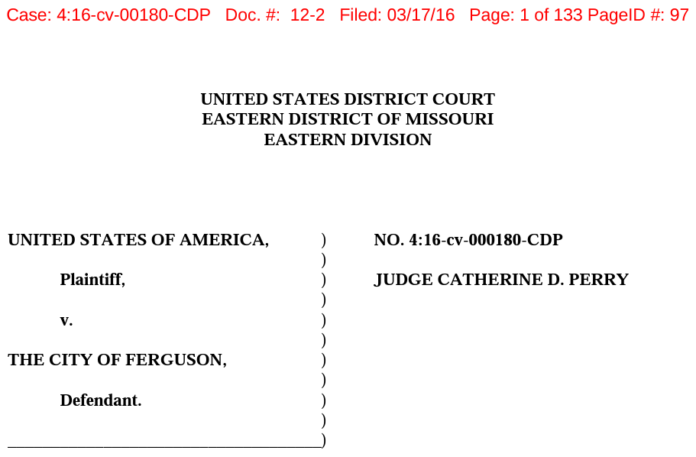The second speaker at this morning’s consent decree was Annette Jenkins. You don’t need to have a very long memory to recall that Ms. Jenkins and this author are not always in perfect harmony. Today was certainly an exception. Jenkins, and indeed every speaker with the exception of Councilor Noah and Mayor Jones, had the same thing to say: After 7 years, not only hasn’t the city met the requirements of the consent decree, we don’t even know where we stand. There was such harmony amongst the commenters that one could be forgiven for assuming they were coordinated, though in fact, there was no coordination at all.
Let’s start with the outliers. Noah, the first comment, praised Chief Doyle for his community engagement efforts, and expressed her support of “Temp Tag Tuesday.” Mayor Jones, the final comment, declared that the city would complete the requirements of the consent decree in 24 months. In between was a “who’s who” of Ferguson discourse – Annette Jenkins, Cassandra Butler, Adrian Shropshire, Alan and Becky Mueller, and myself. While each speaker came from a different place, and had a different focus, the message was the same from them all: It’s far past time for the city to get organized and start communicating.
City attorney Apollo Carey presented a litany of excuses for the city’s failures. But each one was the same: Turnover is the problem. We’re working on it. Regarding the lack of any timely status information, Carey said that “There are times WE don’t know where we are.” One could hardly invent a better formula for failure than our city’s chief legal counsel provided.
The monitor indicated that “This has been a difficult year in terms of progress.” They pointed to the absence of succession planning as a significant part of the problem. The monitor hasn’t filed a report this year, and blamed that on the city’s failure to update the “smart sheet” in which progress is supposed to be marked. The Department of Justice representative said, “A lot of time has passed, there should ahve been more progress.” They indicated a need for internal assessment, and outward facing reporting. Their conclusion: “You can’t map out where you’re going if you don’t know where you are.”
The real bad guy in the room was the DOJ. And to be clear, I don’t mean that because I’m against the consent decree, but rather, because their obviously lackluster performance is a big part of the reason why, to this day, our consent decree is failing. The DOJ’s approach to the consent decree appears to be to throw vague demands at the city, allow us to flounder and fail indefinitely, and find reasons why it is our fault that we are failing. To be sure, the city has not been as diligent as we should be, and that must change. But the DOJ has more than a dozen consent decrees now, with a tremendous amount of experience and knowledge. That they expect a city of 18,000 people and limited resources to reinvent the wheel, while they sit at a distance and do little more than point out our failures, is unconscionable. Their lack of practical support shows how little the Department of Justice really cares about justice.
But regardless of who is to blame, it’s clear that we need somebody with a sharp mind and a sharp pencil to get us through this process. And that gets us to Chris Crabel. Mr. Crabel, who has been with the city for three years, serves as assistant to the city manager. With the sudden resignation of our consent decree coordinator, Crabel is now acting in that capacity. In the few weeks he has done so, he has already become the most clear spoken, purposefully acting person in the room. With behind the scenes help from Nicole Barton, Crabel has already achieved an admirable grasp of the task before us, as evidenced by his presentation: no excuses, no nonsense, just the facts. Crabel is now in the process of updating the “smart sheet” and we expect that regular, public status updates will swiftly follow. For the good of the city, Crabel should remain as our consent decree coordinator until we have finished it.
